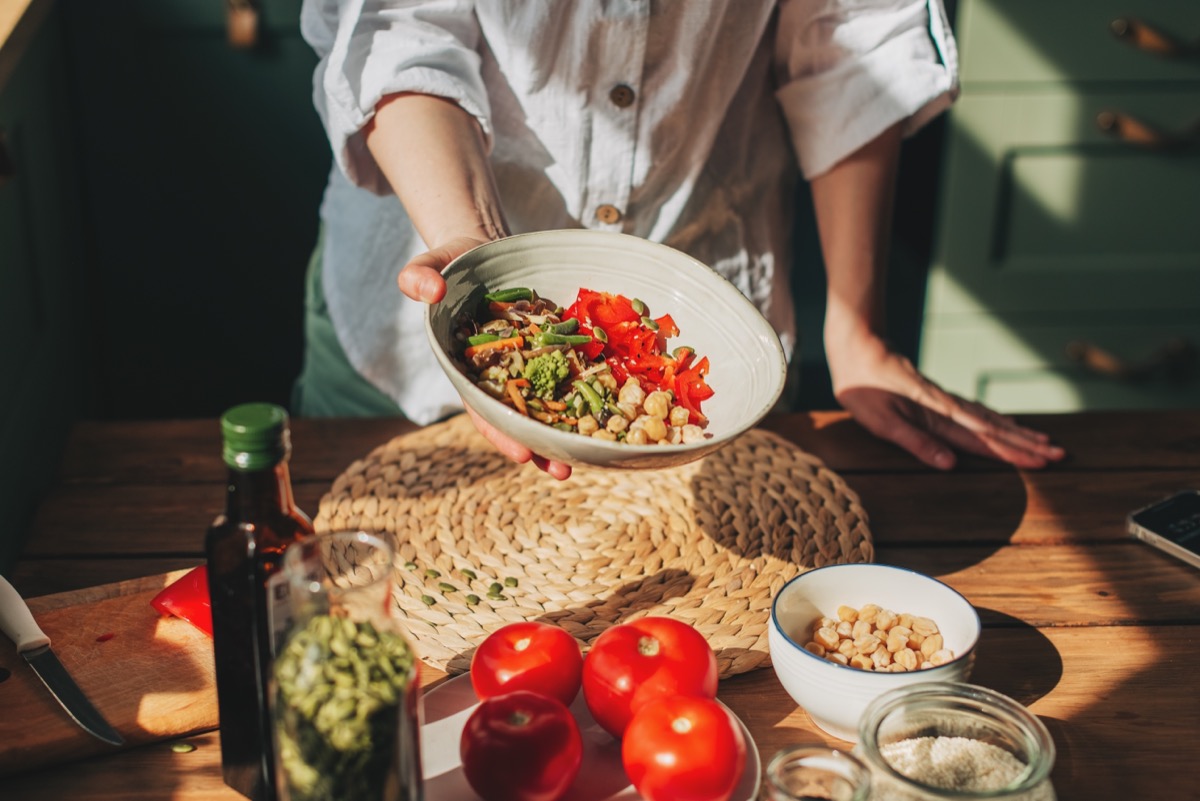Drinking Wine and 8 Other "Rules" to Help You Live to 100, Researchers Say
Here's your cheat sheet for a longer, healthier life.

For many people, there is no pursuit more worthwhile than living to 100. However, your quality of life is also of crucial importance, especially if you plan to stick around for a long time. Experts say that by practicing certain health habits, you can extend not only your lifespan but also your healthspan—the number of years spent free from chronic disease or disability.
Dan Buettner, a National Geographic Fellow and New York Times bestselling author, has spent his career traveling the world in search of Blue Zones—regions with higher-than-average numbers of centenarians. By studying the habits of these long-lived populations, Buettner and his team have identified the "Power 9," a set of "rules" that have helped promote longevity around the world.
Ready to transform your health and extend your lifespan with just a few minor changes—including drinking a daily glass of wine? Read on to learn which nine rules are lengthening lives and staving off illness around the world.
RELATED: People Who Live to 100 Eat the "World's Healthiest Breakfast," Researcher Says.
1
Integrate movement.

Getting regular physical activity is highly advisable if you're hoping to live to 100. The Centers for Disease Control and Prevention (CDC) recommends getting a minimum of 150 minutes of moderate-intensity aerobic exercise per week, which translates into 20 minutes of daily aerobic exercise. In addition, they advise integrating two to three sessions of weekly strength training, which could include weight lifting, using resistance bands, climbing stairs, yoga, or an at-home regimen of push-ups,
However, Buettner says that in most Blue Zones, natural movement throughout the day seems to suffice. "The world's longest-lived people don't pump iron, run marathons, or join gyms. Instead, they live in environments that constantly nudge them into moving without thinking about it. They grow gardens and don't have mechanical conveniences for house and yard work," his team writes.
2
Find your purpose.

From the mountain highlands of Sardinia to the Nicoya Peninsula in Costa Rica to the Japanese prefecture Okinawa, Buettner's team also found that having a purpose in your life could help extend it.
"The Okinawans call it 'Ikigai' and the Nicoyans call it 'plan de vida;' for both it translates to 'why I wake up in the morning.' Knowing your sense of purpose is worth up to seven years of extra life expectancy," Buettner writes.
RELATED: 116-Year-Old Woman With No Major Health Issues Reveals Her Longevity Diet.
3
Lower your stress levels.

Everyone experiences stress from time to time. However, consciously lowering your chronic stress levels could have a profound impact on your health and longevity, as Buettner's team found.
"Stress leads to chronic inflammation, associated with every major age-related disease. What the world's longest-lived people have that we don't are routines to shed that stress," they note.
Whether you find comfort in prayer, the company of others, or a self-care routine, making time to unwind can add years to your life.
4
Stop eating when you're 80 percent full.

Eating a healthy diet is essential if you're hoping to live to 100, but how much you eat can also play a role in your longevity, the experts say.
Buettner's team recommends following the 2,500-year-old Confucian mantra "hara hachi bu," which teaches people to stop eating when they're feeling 80 percent full. One way to do this more consciously is by filling your plate to only 80 percent of your normal portion sizes.
"The 20 percent gap between not being hungry and feeling full could be the difference between losing weight or gaining it. People in the blue zones eat their smallest meal in the late afternoon or early evening and then they don't eat any more the rest of the day," Buettner's team says.
RELATED: 91-Year-Old Fitness Star Shares Her Best Workout Tips to Stay Young.
5
Eat mostly plant-based foods.

In virtually all of the Blue Zones, one major trend emerged: Residents who lived to 100 were likely to have maintained a largely plant-based diet. In fact, Blue Zone centenarians ate an average of two ounces of meat fewer than five times per month. In place of animal products, those populations often relied on beans and legumes as lean sources of protein.
6
Join a faith-based community.

The team interviewed 263 centenarians and found that all but five belonged to a faith-based community. They note that statistically, attending religious services four times per month could add up to 14 years to your life.
"People who pay attention to their spiritual side have lower rates of cardiovascular disease, depression, stress, and suicide, and their immune systems seem to work better… To a certain extent, adherence to a religion allows them to relinquish the stresses of everyday life to a higher power," says Buettner, noting that the denomination of services doesn't appear to matter.
7
Put your family first.

The families of centenarians tend to be close-knit and caring. It makes sense: Foster deep bonds with your loved ones and they'll be more likely to care for you in old age, leading to better health outcomes.
In many Blue Zones, it's common for parents and grandparents to live with their offspring—an arrangement that "lowers disease and mortality rates of children in the home too," Buettner's team says.
RELATED: 63-Year-Old Longevity Doctor Reveals 7 Diet and Exercise Secrets to Stay Young.
8
Join a healthy community.

Surround yourself with people who value health and wellness, and you're likely to embrace a health-conscious lifestyle, too.
"The world's longest-lived people chose–or were born into–social circles that supported healthy behaviors, Okinawans created "moais"—groups of five friends that committed to each other for life," the researchers say.
Joining a walking or fitness club, making a pact of accountability with friends, or simply making your healthy habits a family affair can all help lead to longevity.
9
Drink red wine in moderation.

Increasingly, research suggests that no amount of alcohol is considered healthy or safe. However, the Blue Zones researchers determined that drinking high-quality red wine in moderation—no more than one serving daily for women and two for men—was associated with longevity in Blue Zone communities.
"The trick is to drink one to two glasses per day (preferably Sardinian Cannonau wine), with friends and/or with food. And no, you can't save up all week and have 14 drinks on Saturday," the researchers note.
Best Life offers the most up-to-date information from top experts, new research, and health agencies, but our content is not meant to be a substitute for professional guidance. When it comes to the medication you're taking or any other health questions you have, always consult your healthcare provider directly.





















